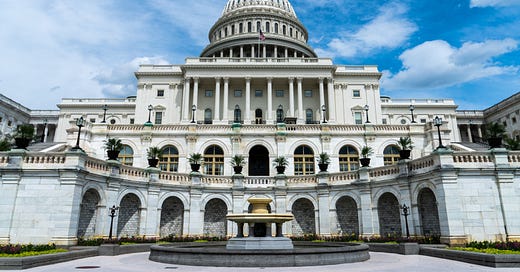Failing institutions result in a failing America
Gallup reveals the ugly details of lost public trust in 16 institutions
No one would look across the American landscape, see the unfolding social chaos and confusion, and contend all is well in America.
Everywhere we look there seems to be mass mayhem. We’re asked to deny common sense, reality, and even biology.
No one would be surprised that Gallup, the trusted and renowned Washington D.C.-based polling firm, has seen consistent falling public trust in 16 institutions.
This annual Gallup poll measures the percentage of people with a “great deal” or “fair amount” of confidence in specific institutions. The only two institutions at 60 percent or higher are small business, 65 percent, and the military at 60 percent. In 2021, Small business was at 70 percent and the military at 69 percent. In 2021, the police stood at 51 percent with public trust, which was the only other institution north of 50 percent. The police dropped to 45 percent in 2022 and is now at 43 percent.
The following are the other 13 institutions and their current percentage of public trust, or confidence:
The medical system, 34 percent;
The church or organized religion, 32 percent;
U.S. Supreme Court, 27 percent;
Banks, 26 percent;
Public schools, 26 percent;
The presidency, 26 percent;
Large technology companies, 26 percent;
Organized labor, 25 percent;
Newspapers, 18 percent;
Criminal justice system, 17 percent;
TV news, 14 percent;
Big business, 14 percent; and
Congress, 8 percent.
There are other institutions not even in this list, such as the family, higher ed, Hollywood, music, sports, and others. Gallup’s recent poll on higher ed showed declining public trust since 2015, from 57 percent to the current 36 percent.
Almost across the board, there is sweeping lost public trust. This is not a sign of a healthy nation.
These poor public trust numbers did not evolve overnight. Public trust or confidence in institutions erodes with a slow fade. Public trust crumbles over years, yes, even decades, of little events that people notice. Those noticed events shape attitudes. Those attitudes shape the mindset of swathes of Americans.
Yuval Levin is a scholar at the conservative Washington D.C.-based American Enterprise Institute. He has written a book titled, “A Time To Build,” that focuses on institutions. He spoke with Russ Roberts at Stanford University on the EconTalk podcast in February 2020.
Levin contends institutions “form our common actions to makes us more effective” as communities and a nation. Institutions, as basic as family and marriage, are larger groups, such as politics, professions, and business. He said confidence flows from public trust.
“We trust institutions when we believe they form trustworthy people,” Levin said.
He argues these institutions help form people through a specific set of ethics and patterns that can cause the public to see them favorably and unfavorably.
Levin said that while the institutions are to be formative, far too many people who represent institutions engage in performative activities, rather than maintaining the ethics and patterns that build those specific institutions.
Other than Levin, few people ask questions to reverse course. I believe there is a spiritual aspect to altering this course. It requires people of character, integrity, and being self-governed ethics dictated by biblical truth. It requires people who do not compartmentalize their lives into the spiritual and then everything else. No, the spiritual dimension impacts everything that comes from us. Even Levin’s working definition of public trust and institutions focuses on common areas of life forming ethics in people.
We live in a post-Christian country. While this phrase has been used more frequently in the past 2 to 5 years, we are on a trend of being a post-Christian nation for at least 40 years. The late Christian apologist Dr. Francis Schaeffer predicted it in the early 1980s when he was still alive.
While I do believe we live in a post-Christian nation, I also believe that all hope is not lost. There have been little signs that Americans know something is missing and they yearn for something bigger than themselves, In February, the Asbury Revival–or whatever one calls it–grabbed the attention of even the legacy media. Also, on July 8, Pastor Greg Laurie at California-based Harvest Church baptized 4,500 people in the Pacific Ocean.
Meanwhile, Pastor Steven Lawson of Trinity Bible Church in Dallas and a fellow at Ligonier Ministries recently stated, “America is headed for either ruin or revival. There is no other destiny.”
I believe a genuine revival would produce the character and integrity across ur institutions that would start moving those public trust numbers in a different direction.
The lagging numbers of public trust in institutions give pause and cause for concern. However, there is no reason to give up hope because as it states in the gospels and elsewhere: “with God all things are possible.”




